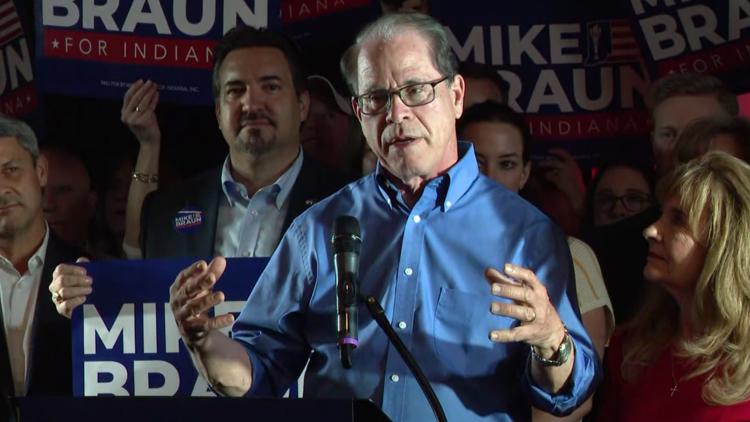JASPER, Indiana — There have been varied breeding grounds for future Indiana governors.
After the American Civil War, Govs. Conrad Baker, Isaac Gray, Alvin Hovey, Ira Joy Chase, James Atwell Mount and Winfield T. Durbin used their battlefield experiences at Shiloh, Vicksburg, Chickamauga and Sherman’s March to the Sea to forge political careers that brought them to ultimate power at the Statehouse.
Following World War I, Govs. Paul V. McNutt and George N. Craig became commanders of the American Legion based in Indianapolis before being elected to helm of the state. After World War II, Govs. Matthew Welsh, Roger D. Branigin, Edgar Whitcomb and Robert Orr parlayed their military experiences for politics.
And there was a spate of lieutenant governors - Orr, Frank O’Bannon, Joe Kernan and, finally, Eric Holcomb - who rose to the top spot.
With the May Republican primary nomination of Mike Braun, a new trend is taking shape: The path to the Statehouse second floor begins in our nation’s capital, dysfunctional Washington, D.C.
Braun joins Govs. Mike Pence and Mitch Daniels as Hoosiers who have left the warrens of power on or near Capitol Hill to win the Indiana governorship. Braun is finishing up a single term in the U.S. Senate. Pence spent 12 years in Congress before returning to Indianapolis to run for governor in 2012. Daniels served on the staff of U.S. Sen. Richard Lugar, on the National Republican Senatorial Committee, as political advisor to President Reagan and was White House budget director under President George W. Bush when he decided to return in 2003 to end a 16-year Democratic dynasty.
This trend might not end with Braun. U.S. Rep. Jim Banks is the odds-on favorite to win Braun's Senate seat in November. Had Braun not run for governor, Banks almost certainly would have and will likely be positioning for the 2032 race. When reporters asked Braun's senior advisor Joshua Kelley earlier this week whether the senator would seek reelection in '28 if he wins in November, Kelley answered, "Absolutely."
Last November in an interview in Braun's Jasper office of Meyer Distributing, I observed that in Indiana history, from Gov. Oliver P. Morton to Evan Bayh, ex-governors ended up in the U.S. Senate. "You’re attempting to do the opposite."
"You know why?" Braun responded. "Because they’re from the farm system of politics. The people who got done being governor just weren’t done with politics. They wanted to continue. My blessing is I did something in the real world first before I decided to get into politics at a level of significance.
"When I decided to run for governor, it was a situation of either/or," Braun continued. "If you did not do it now, it would be another nine years. I pledged not to run for more than two Senate terms. I would have never reneged on it. This was basically a decision on what made the most sense."
I asked Braun, do you feel you’re more of an executive in heart and soul?
"I feel I’m good at both because legislatively I knew what to get done as a legislator," he said. "To me if you’re an entrepreneur you know how to get from here to there. I had to figure out almost everything in terms of how to take that hardscrabble business and turn it into a successful one. I think the difference basically is if you come from the typical farm system political background, you get a law degree, pivot almost immediately into elected or appointed politics and even practice your trade. But most people who end up wanting to become a senator picked politics in elected or appointed office as their career. I think that’s a big mistake.
"I don’t think you learn near enough once you get there," he said. "If you don’t have the real experience you’re going to depend heavily on your chief of staff."
He cited Gov. Mitch Daniels, who mixed his political resume working with mayor and senator Lugar along with an executive position at Eli Lilly Company. "Mitch knew business along with government," Braun said. "That’s why he felt comfortable on what to do when he became the state’s CEO."
Braun likes to tell the story of how he took on spiraling health insurance costs to his employees, and switched to a self-insurance plan that turned them into “consumers” who have “skin in the game.” It saved his employees and campany hundreds of thousands of dollars. He believes he can do the same with Indiana’s 30,000 state government workforce.
Braun is now beginning to put his stamp on the Indiana GOP. A unity event in Carmel on June 24 will include Braun's primary opponents Suzanne Crouch, Brad Chambers and Eric Doden along with much of the Republican establishment.
Republican Chairwoman Anne Hathaway has an open invitation from Braun to keep her current (and temporary) job ... if she wants it.
"I don't want to speak for Anne," said Kelley. "She's probably working through a process of where she wants to go next. She can write her own ticket on when she decides to move on to the next step."
And then there are Fridays in Jasper, when Braun invites Hoosier folks to stop by for a chat. Kelley told reporters that will continue, though there is now a lengthy waiting list.
Brian Howey is senior writer and columnist for Howey Politics Indiana/State Affairs. Find Howey on Facebook and X @hwypol.



